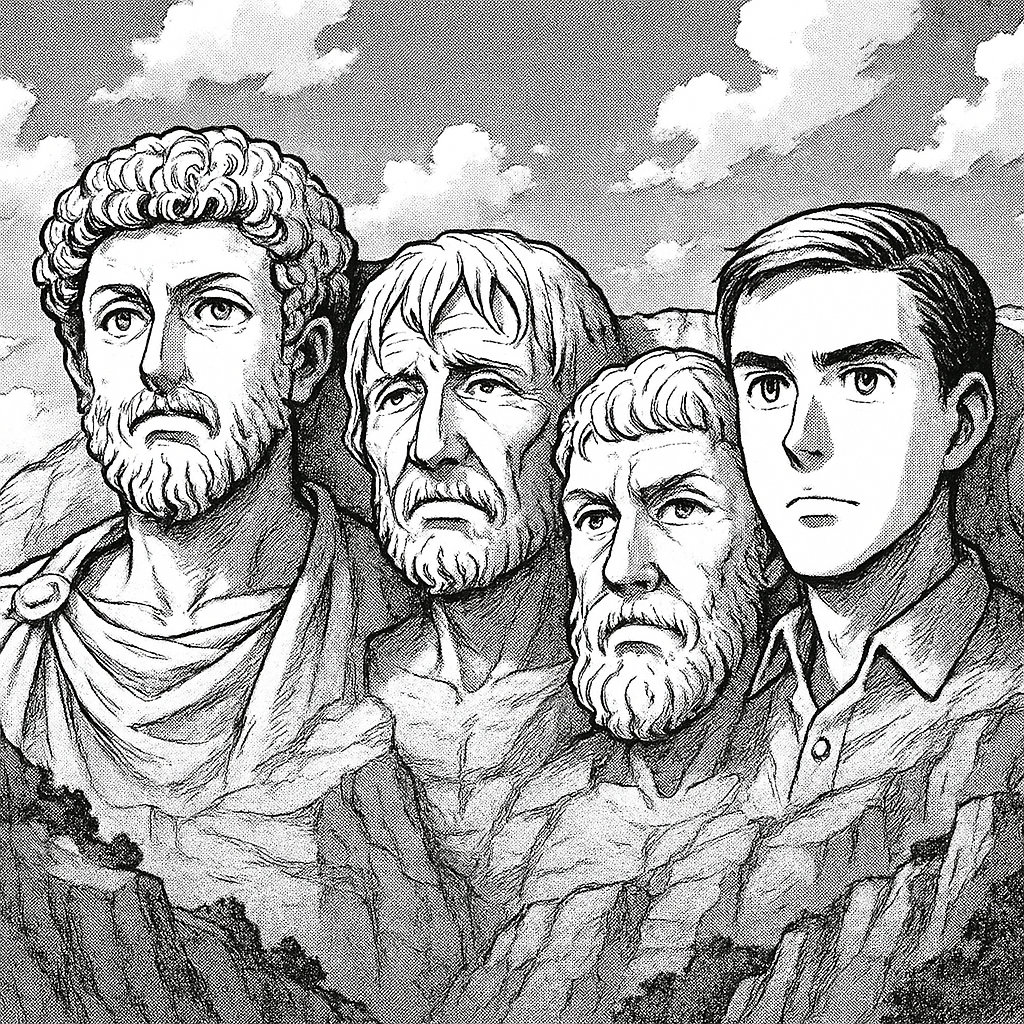In the fast-paced, often chaotic world of product management, where priorities shift like sand and stakeholders change their minds faster than market trends, ancient philosophy might seem like an unlikely source of guidance. Yet the teachings of Stoicism—a philosophical school founded in Athens around 300 BCE—offer profound insights for today’s product managers navigating uncertainty, pressure, and the endless pursuit of building something meaningful.
Product management is, at its core, about making decisions with incomplete information, managing competing priorities, and maintaining clarity of vision when everything around you is in flux. The Stoic philosophers faced similar challenges in their pursuit of wisdom, virtue, and inner peace amid the unpredictability of life. Their teachings provide a framework not just for personal resilience, but for professional excellence in product leadership.
The Dichotomy of Control: Focus on What You Can Influence
The foundational principle of Stoicism, articulated most clearly by Epictetus, is the dichotomy of control: “Some things are within our power, while others are not.” For product managers, this distinction is revolutionary.
What you cannot control:
- Market conditions and competitive moves
- Engineering velocity and technical debt
- Customer behavior and adoption rates
- Executive decisions and budget allocations
- External dependencies and vendor timelines
What you can control:
- Your research methodology and data analysis
- The clarity of your product strategy and roadmap
- How you communicate with stakeholders
- Your response to setbacks and failures
- The questions you ask and problems you prioritize
As Ryan Holiday writes in “The Obstacle Is the Way,” “You have power over your mind—not outside events. Realize this, and you will find strength.” This mindset shift transforms product management from a reactive role of constant firefighting to a proactive discipline of strategic thinking and measured response.
When a major competitor launches a feature you’ve been developing, the Stoic product manager doesn’t panic or rush to copy. Instead, they focus on what they can control: analyzing the competitive landscape, understanding their unique value proposition, and making deliberate decisions about their product direction.
Marcus Aurelius on Leadership Through Adversity
Marcus Aurelius, the philosopher-emperor, understood leadership under pressure better than perhaps any other Stoic. His “Meditations,” written while managing an empire and leading military campaigns, offers invaluable lessons for product leaders.
“You have power over your mind—not outside events. Realize this, and you will find strength,” he wrote. For product managers, this translates into maintaining strategic clarity even when everything seems to be going wrong.
When your product launch fails, when key metrics are declining, when stakeholders are losing confidence—these are the moments that define product leadership. Marcus Aurelius taught that our character is revealed not in success, but in how we respond to adversity.
The Stoic approach to product crises:
- Accept reality quickly – Don’t waste energy denying what has happened
- Focus on the response – What can you learn and how can you improve?
- Communicate with clarity – Be transparent about challenges and your plan forward
- Maintain long-term perspective – One setback doesn’t define your product or career
“Confine yourself to the present,” Marcus advised. Product managers often get overwhelmed thinking about all the features they need to build, all the problems they need to solve. The Stoic approach is to focus intensely on the most important thing right now.
Seneca on Decision-Making and Resource Management
Lucius Annaeus Seneca, advisor to emperors and successful businessman, understood the practical application of Stoic principles in high-stakes environments. His insights on decision-making and resource allocation are particularly relevant to product management.
“It is not that we have a short time to live, but that we waste a lot of it,” Seneca observed. Product managers constantly battle resource constraints—limited engineering time, tight budgets, competing priorities. The Stoic approach is to be ruthlessly focused on what truly matters.
Seneca’s concept of “enough” is powerful for product strategy. In our growth-obsessed culture, product managers often fall into the trap of trying to build everything for everyone. The Stoic asks: What is actually necessary? What features align with our core mission? What complexity can we eliminate?
Seneca’s framework for product decisions:
- Necessity: Is this feature essential to our users’ success?
- Virtue: Does this decision align with our values and mission?
- Wisdom: Are we making this choice based on data and insight, not ego or competition?
“Every new beginning comes from some other beginning’s end.” Product managers must constantly make decisions about what not to build, what features to sunset, what experiments to end. Seneca’s wisdom reminds us that saying no is often more important than saying yes.
Epictetus on Perception and Response
Epictetus, who transitioned from slave to influential teacher, understood better than anyone that our circumstances don’t define us—our responses do. “It’s not what happens to you, but how you react to it that matters.”
For product managers, this principle is transformative. User complaints, negative reviews, failed experiments, missed deadlines—these are not inherently good or bad. They are information. Your response determines whether they become obstacles or opportunities.
The Epictetus Method for product challenges:
- Separate facts from interpretations – “We missed our launch date” vs. “We’re failing as a team”
- Ask better questions – “What can we learn?” instead of “Who’s to blame?”
- Focus on improvement – How can this experience make our product and process better?
“No one can hurt you without your permission,” Epictetus taught. In product management, this translates to not letting external pressures compromise your judgment or values. Stakeholder demands, competitive pressure, and market volatility are external forces. Your response—rooted in data, strategy, and principle—is what matters.
Ryan Holiday’s Modern Application: The Obstacle as the Way
Modern Stoic author Ryan Holiday has brilliantly translated ancient wisdom for contemporary challenges. His concept of “the obstacle is the way” is particularly relevant for product managers who face constant roadblocks.
“The impediment to action advances action. What stands in the way becomes the way,” Holiday writes, echoing Marcus Aurelius. Every product manager faces obstacles: technical limitations, resource constraints, market challenges, organizational resistance. The Stoic approach is to see these not as barriers, but as the path itself.
Examples of obstacles becoming advantages:
- Limited engineering resources → Forces prioritization and creative solutions
- Competitive pressure → Drives innovation and differentiation
- User complaints → Provides direct feedback for improvement
- Budget cuts → Eliminates nice-to-have features, focuses on essentials
Holiday’s emphasis on “controlling your perceptions” is crucial for product managers. The difference between successful and struggling product leaders often isn’t their circumstances, but how they frame and respond to those circumstances.
Building Stoic Product Practices
Implementing Stoic principles in product management isn’t about becoming emotionless or passive. It’s about developing the mental frameworks and daily practices that lead to better decisions and greater resilience.
Daily Stoic practices for product managers:
Morning Preparation – Before checking emails or diving into meetings, spend five minutes considering: What are your priorities today? What challenges might you face? How will you respond to setbacks?
Evening Reflection – End each day by reviewing: What went well? What could you have handled better? What did you learn? This practice, inspired by Seneca’s daily self-examination, builds wisdom over time.
The Discipline of Perception – When facing challenges, pause and ask: “Is this within my control?” If not, focus your energy elsewhere. If yes, what’s the most rational response?
Premeditation of Obstacles – Before major launches, releases, or decisions, consider what could go wrong. Not to create anxiety, but to prepare mentally and practically for challenges.
The Virtue of Product Management
The Stoics believed in four cardinal virtues: Wisdom, Justice, Courage, and Temperance. These aren’t abstract ideals—they’re practical guidelines for product leadership.
Wisdom in product management means making decisions based on data, user research, and long-term thinking rather than ego, politics, or short-term pressures.
Justice means building products that truly serve users, treating team members fairly, and being honest about trade-offs and limitations.
Courage is required to make difficult decisions, challenge assumptions, advocate for users, and admit when you’re wrong.
Temperance means restraint—not building every requested feature, not chasing every opportunity, maintaining focus on what truly matters.
Conclusion: The Philosophical Product Manager
Product management is ultimately about human flourishing—creating tools, services, and experiences that help people live better lives. The Stoic philosophers were also concerned with human flourishing, but they understood that external circumstances are less important than our inner character and responses.
The modern product manager who embraces Stoic principles doesn’t become passive or accepting of mediocrity. Instead, they become more focused, more resilient, and more effective. They waste less energy on things beyond their control and invest more wisely in areas where they can make a real difference.
As Marcus Aurelius reminds us, “Waste no more time arguing what a good [product manager] should be. Be one.” The path to product excellence isn’t found in the latest framework or methodology—it’s found in the daily practice of wisdom, virtue, and rational response to the challenges we face.
In our age of constant distraction and reactive decision-making, the ancient wisdom of Stoicism offers product managers something precious: the clarity to see what matters, the courage to act on principle, and the resilience to persist through inevitable setbacks. These are not just philosophical ideals—they are the practical tools of exceptional product leadership.
The obstacle is the way. The path to great products runs directly through the challenges we face, not around them.

Aye Stephen is an accomplished Product Manager and currently Chief Product Officer at one of Europe’s leading eCommerce ERP solutions. With a strong background in product management and leadership coming from 20 years experience, he is an expert in building high performing product teams in agile environments and organizational change management. Stephen holds an MBA from Goethe Business School Frankfurt and an M.A. in American Studies/Media Science from Philipps University Marburg.

Leave a Reply